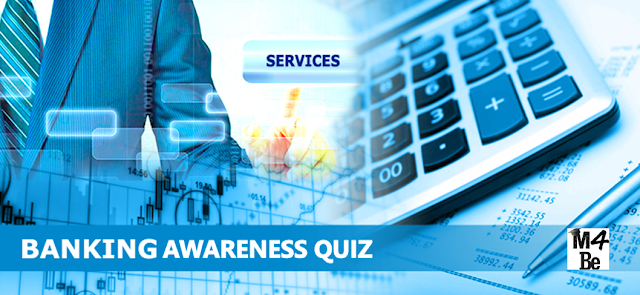Banking
Awareness Quiz (Set - 30)
1. Expand MAT related to tax?
a) Minimum
Additional Tax
b) Maximum
Alternative Tax
c) Maximum
Additional Tax
d) Minimum
Alternative Tax
e) None of these
2. Local Area Banks
a) are licensed
under the Banking Regulation Act, 1956
b)are eligible
for inclusion in the Second Schedule to the Reserve bank of India Act, 1934
c) Have minimum
paid up capital of Rs. 5 crore with promoters’ contribution being at least Rs.
2 crore
d) all of the
above
e) none of the
above
Answer:
d)
3. Which agency in India provides refinance of export credit?
a) SIDBI
b) NABARD
c) RBI
d) EXIM Bank
e) Government of
India
Answer:
d)
4. The primary function of a central co-operative bank is to
a) mobilize the
resources in the district for financing its members to the maximum extent
possible
b) to channelize
the flow of funds from the cooperative banks
c) All of the
above
d) Either a) or
b)
e) none of the
above
Answer:
c)
5. What is Reserve Money (RM)?
a) Currency in
circulation with the public
b) Deposits of
some people with RBI
c) Cash reserves
of the banks
d) Total of the
above three options
e) None of the
above
Answer:
d)
6. Which of the following is the first Universal Bank established in India?
a) IDBI Bank
Ltd.
b) ICICI Bank
ltd.
c) Reserve bank
of India
d) NABARD
e) HDFC Bank
Ltd.
Answer:
b)
7. What is the objective of introduction of “Marginal Standing Facility”
by RBI?
a) To contain
volatility in the overnight inter-bank rates
b) To contain
volatility in MIBOR
c) To contain
volatility in LIBOR
d) To match with
standard Tier 1 capital Ratio
e) None of these
Answer:
a)
8. The term “Merchant Banking” connotes
a) Services
rendered by banks for merchants and traders capital requirements to merchants
covered under DICGC Guarantee Scheme
b) Telegraphic
transfers effected by merchants
c) Catering to
the needs of corporate customers raising finance
d) All of the
above
e) none of the
above
Answer:
c)
9. Expand FRBM.
a) Financial
Responsibility and Budget Management
b) Fiscal
Responsibility and Budget Maintenance
c) Fiscal
Responsibility and Budget Management
d) Fiscal Risk
and Budget Management
e) None of these
Answer:
c)
10. The promoters of Local Area Banks may comprise
a) individuals
b) corporate
entities
c) trusts and
societies
d) accepts
deposits from public
e) all of the
above
Answer:
e)
11. The regional Rural Banks are sponsored by
a) Unit Trust of
India
b) Reserve Bank
of India
c) Life
Insurance Corporation of India
d) NABARD
e) Any Scheduled
Commercial bank
Answer:
e)
12. Deficit financing can (these are also demerits of it)
a) Cause
inflation
b) Bring rise in
fiscal deficit
c) Bring rise in
credit creation in banks
d) All above
e) None of the
above
Answer:
d)
13. Central co-operative banks
a) occupy a
crucial importance in the co-operative credit structure
b) from an
important link between the state cooperative bank at the apex and the primary
agricultural credit societies at the base
c) are closer to
the primary societies than an apex bank could be
d) all of the
above
e) none of the
above
Answer:
d)
14. If the RBI wants to infuse credit in Banking system in our country,
which of the followings can be done?
a) Decreasing
CRR
b) Decreasing
SLR
c) Both (a) and
(b)
d) None of the
above
e) Cannot be
determined
Answer:
c)
15. Deposits with Regional Rural Banks are insured by
a) Life
Insurance Corporation of India
b) General
Insurance corporation
c) Deposits
Insurance and Credit Guarantee corporation
d) None of the
above
e) all of the
above
Answer:
c)
16. If the rupees depreciate, what is the effect on the exporters?
a) They are
unaffected
b) They are in
loss
c) They are in
profit
d) They get
credit crunch
e) None of these
Answer:
c)
17. Under merchant banking, consultancy services are rendered by
banks/merchant bankers for
a) floating of
new companies
b) preparation,
planning and execution of new projects
c) giving expert
guidance and managing the new promotions or new promotions of industries/enterprises
d) all of the
above
e) none of the
above
Answer:
d)
18. When the Government of India cannot raise enough financial resources
through taxation, it finances its expenditure through various means like borrowing
from market, running down its balances with RBI etc. This can be exactly called
as
a) Fiscal
Deficit Financing
b) Deficit
Financing
c) Capital
Infusion
d) Restructuring
e) None of these
Answer:
b)
19. Under the Banking Regulation Act, 1949, which of the following is
not qualified to be called as banks in the co-operative sector?
a) Urban
Co-operative banks
b) State
Co-operative banks
c) Primary
Agricultural Credit Societies
d) Central
Co-operative Banks
e) None of the
above
Answer:
c)
20. Buying and selling of eligible securities by RBI in the money market
can be termed as
a) Open Economy
Operations
b) Open Market
Operations
c) Credit
Control Measures
d) Credit
Creation Measures
e) None of these
Answer:
b)






